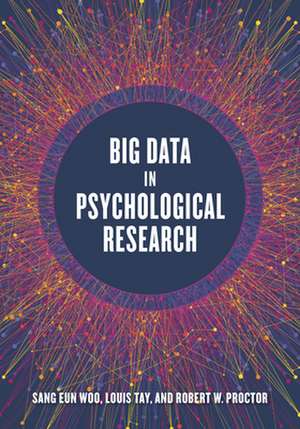Big Data in Psychological Research
Autor Sang Eun Woo, Louis Tay, Robert W. Proctoren Limba Engleză Hardback – 22 iun 2020
Preț: 584.26 lei
Preț vechi: 641.05 lei
-9% Nou
Puncte Express: 876
Preț estimativ în valută:
111.80€ • 117.02$ • 93.05£
111.80€ • 117.02$ • 93.05£
Carte indisponibilă temporar
Doresc să fiu notificat când acest titlu va fi disponibil:
Se trimite...
Preluare comenzi: 021 569.72.76
Specificații
ISBN-13: 9781433831676
ISBN-10: 1433831678
Pagini: 470
Dimensiuni: 198 x 261 x 29 mm
Greutate: 0.98 kg
Editura: Wiley
ISBN-10: 1433831678
Pagini: 470
Dimensiuni: 198 x 261 x 29 mm
Greutate: 0.98 kg
Editura: Wiley
Cuprins
Contributors
Introduction
Sang Eun Woo, Louis Tay, and Robert W. Proctor
I. BACKGROUND AND OVERVIEW
1. Big Data Science: A Philosophy of Science Perspective
Brian D. Haig
2. From Small-Scale Experiments to Big Data: Challenges and Opportunities for Experimental Psychologists
Robert W. Proctor and Aiping Xiong
3. Big Data for Enhancing Measurement Quality
Sang Eun Woo, Louis Tay, Andrew T. Jebb, Michael T. Ford, and Margaret L. Kern
II. INNOVATIONS IN LARGE-SCALE DATA COLLECTION AND ANALYSIS TECHNIQUES
4. Internet Search and Page View Behavior Scores: Validity and Usefulness as Indicators of Psychological States
Michael T. Ford
5. Observing Human Behavior Through Worldwide Network Cameras
Sara Aghajanzadeh, Andrew T. Jebb, Yifan Li, Yung-Hsiang Lu, and George K. Thiruvathukal
6. Wearable Cameras, Machine Vision, and Big Data Analytics: Insights Into People and the Places They Go
Andrew B. Blake, Daniel I. Lee, Roberto De La Rosa, and Ryne A. Sherman
7. Human-Guided Visual Analytics for Big Data
Morteza Karimzadeh, Jieqiong Zhao, Guizhen Wang, Luke S. Snyder, and David S. Ebert
8. Text Mining: A Field of Opportunities
Padmini Srinivasan
III. APPLICATIONS
9. Big Data in the Science of Learning
Sidney K. D’Mello
10. Big Data in Social Psychology
Ivan Hernandez
11. Big Data in Health Care Delivery
Mohammad Adibuzzaman and Paul M. Griffin
12. The Continued Importance of Theory: Lessons From Big Data Approaches to Language and Cognition
Brendan T. Johns, Randall K. Jamieson, and Michael N. Jones
13. Big Data in Developmental Psychology
Kevin J. Grimm, Gabriela Stegmann, Ross Jacobucci, and Sarfaraz Serang
14. Applying Principles of Big Data to the Workplace and Talent Analytics
Q. Chelsea Song, Mengqiao Liu, Chen Tang, and Laura F. Long
IV. RECOMMENDATIONS FOR RESPONSIBLE AND RIGOROUS USE OF BIG DATA
15. The Belmont Report in the Age of Big Data: Ethics at the Intersection of Psychological Science and Data Science
Alexandra Paxton
16. Promoting Robust and Reliable Big Data Research in Psychology
Joshua A. Strauss and James A. Grand
17. Privacy and Cybersecurity Challenges, Opportunities, and Recommendations: Personnel Selection in an Era of Online Application Systems and Big Data
Talya N. Bauer, Donald M. Truxillo, Mark P. Jones, and Grant Brady
18. Privacy Enhancing Techniques for Security
Elisa Bertino
V. CONCLUDING REMARKS
19. Future Research Directions for Big Data in Psychology
Frederick L. Oswald
Index
About the Editors
Introduction
Sang Eun Woo, Louis Tay, and Robert W. Proctor
I. BACKGROUND AND OVERVIEW
1. Big Data Science: A Philosophy of Science Perspective
Brian D. Haig
2. From Small-Scale Experiments to Big Data: Challenges and Opportunities for Experimental Psychologists
Robert W. Proctor and Aiping Xiong
3. Big Data for Enhancing Measurement Quality
Sang Eun Woo, Louis Tay, Andrew T. Jebb, Michael T. Ford, and Margaret L. Kern
II. INNOVATIONS IN LARGE-SCALE DATA COLLECTION AND ANALYSIS TECHNIQUES
4. Internet Search and Page View Behavior Scores: Validity and Usefulness as Indicators of Psychological States
Michael T. Ford
5. Observing Human Behavior Through Worldwide Network Cameras
Sara Aghajanzadeh, Andrew T. Jebb, Yifan Li, Yung-Hsiang Lu, and George K. Thiruvathukal
6. Wearable Cameras, Machine Vision, and Big Data Analytics: Insights Into People and the Places They Go
Andrew B. Blake, Daniel I. Lee, Roberto De La Rosa, and Ryne A. Sherman
7. Human-Guided Visual Analytics for Big Data
Morteza Karimzadeh, Jieqiong Zhao, Guizhen Wang, Luke S. Snyder, and David S. Ebert
8. Text Mining: A Field of Opportunities
Padmini Srinivasan
III. APPLICATIONS
9. Big Data in the Science of Learning
Sidney K. D’Mello
10. Big Data in Social Psychology
Ivan Hernandez
11. Big Data in Health Care Delivery
Mohammad Adibuzzaman and Paul M. Griffin
12. The Continued Importance of Theory: Lessons From Big Data Approaches to Language and Cognition
Brendan T. Johns, Randall K. Jamieson, and Michael N. Jones
13. Big Data in Developmental Psychology
Kevin J. Grimm, Gabriela Stegmann, Ross Jacobucci, and Sarfaraz Serang
14. Applying Principles of Big Data to the Workplace and Talent Analytics
Q. Chelsea Song, Mengqiao Liu, Chen Tang, and Laura F. Long
IV. RECOMMENDATIONS FOR RESPONSIBLE AND RIGOROUS USE OF BIG DATA
15. The Belmont Report in the Age of Big Data: Ethics at the Intersection of Psychological Science and Data Science
Alexandra Paxton
16. Promoting Robust and Reliable Big Data Research in Psychology
Joshua A. Strauss and James A. Grand
17. Privacy and Cybersecurity Challenges, Opportunities, and Recommendations: Personnel Selection in an Era of Online Application Systems and Big Data
Talya N. Bauer, Donald M. Truxillo, Mark P. Jones, and Grant Brady
18. Privacy Enhancing Techniques for Security
Elisa Bertino
V. CONCLUDING REMARKS
19. Future Research Directions for Big Data in Psychology
Frederick L. Oswald
Index
About the Editors
Notă biografică
Descriere
Technological advances have led to an abundance of widely-available data on every aspect of life today. Psychologists today have more information than ever before on human cognition, emotion, attitudes, and behaviour. This book addresses the opportunities and challenges that this data presents to psychological researchers.
